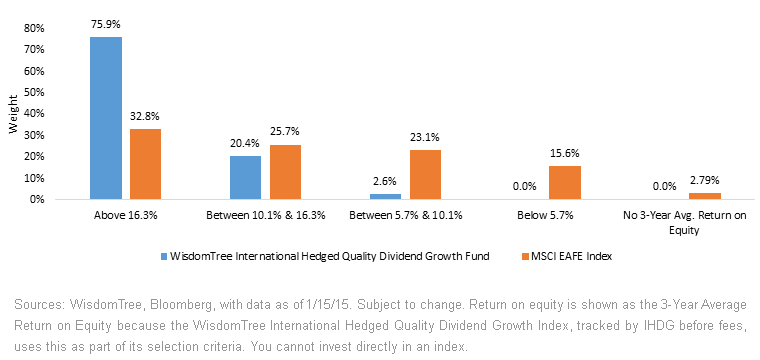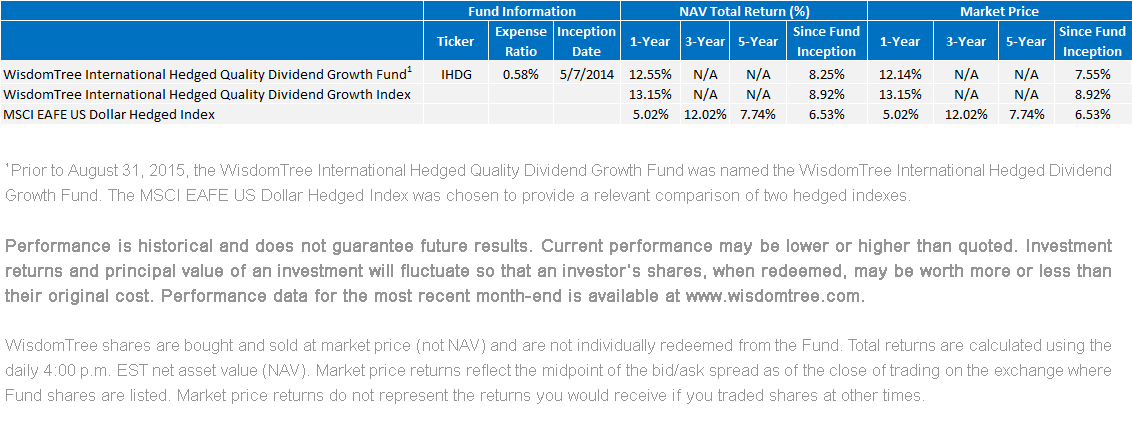Tax Loss Opportunities You Don’t Want to Miss


 Average Annual Returns, as of December 31, 2015
Average Annual Returns, as of December 31, 2015
 For definitions of indexes in the charts, visit our glossary.
This strategy is dividend weighted, so it also incorporates a relative value rebalancing discipline, in addition to its quality stock selection focus. While adding value through its stock selection, this Index maintains a high correlation to international benchmarks on a local currency basis (0.97 to the MSCI EAFE Index, measured in local currency), but due to the currency hedge, it has a lower correlation to the traditional MSCI EAFE Index with currency exposure (0.89 correlation).3
The WisdomTree Dynamic Currency Hedged International Equity Fund (DDWM): Dynamic Currency-Hedging International Equities
One question investors may ask is how to decide when it is best to rotate into hedged strategies from unhedged strategies—and vice versa. Now that currency hedging has become a popular tool, how does an investor know if it’s becoming less attractive to hedge?
We’d point out that hedging has important volatility-reducing properties, and these hedged strategies should really serve as a good baseline portfolio. But if an investor wants a tactical hedging element, WisdomTree has created a solution that incorporates a more tactical currency hedge based on factors we found to be most important in driving currency movements over time.
The dynamic currency hedge in the WisdomTree Dynamic Currency Hedged International Equity Index tracked by DDWM before fees, uses the same equity index that has more than nine years of real-time results,4 but it layers a dynamic currency hedge on top of it. The WisdomTree International Equity Index has tracked the MSCI EAFE Index with a 0.99 correlation5—showing very close tracking to the broad international benchmark—but it has done so while also delivering higher returns than the MSCI EAFE Index since its inception.
Access the standardized performance of DDWM here.
Read more about the indexing process underlying DDWM here.
WisdomTree believes DDWM and IHDG could serve as a replacement for core international allocations—whether hedged or unhedged. Utilizing a tactical tax-loss-harvesting opportunity could be an excellent way to rotate into these strategies for the long term, in our view.
1Source: Bloomberg, as of 12/31/15.
2Source: Bloomberg. Measures period from approximately 8/10/15 to 1/15/16 for the MSCI EAFE US Dollar Hedged Index.
3Source: Bloomberg. Measured from the inception of the WisdomTree International Hedged Quality Dividend Growth Index on 12/2/13 to 1/15/15.
4Refers to the WisdomTree International Equity Index, with an inception date of 6/1/06.
5Source: Bloomberg, from 6/1/06 to 12/31/15.
For definitions of indexes in the charts, visit our glossary.
This strategy is dividend weighted, so it also incorporates a relative value rebalancing discipline, in addition to its quality stock selection focus. While adding value through its stock selection, this Index maintains a high correlation to international benchmarks on a local currency basis (0.97 to the MSCI EAFE Index, measured in local currency), but due to the currency hedge, it has a lower correlation to the traditional MSCI EAFE Index with currency exposure (0.89 correlation).3
The WisdomTree Dynamic Currency Hedged International Equity Fund (DDWM): Dynamic Currency-Hedging International Equities
One question investors may ask is how to decide when it is best to rotate into hedged strategies from unhedged strategies—and vice versa. Now that currency hedging has become a popular tool, how does an investor know if it’s becoming less attractive to hedge?
We’d point out that hedging has important volatility-reducing properties, and these hedged strategies should really serve as a good baseline portfolio. But if an investor wants a tactical hedging element, WisdomTree has created a solution that incorporates a more tactical currency hedge based on factors we found to be most important in driving currency movements over time.
The dynamic currency hedge in the WisdomTree Dynamic Currency Hedged International Equity Index tracked by DDWM before fees, uses the same equity index that has more than nine years of real-time results,4 but it layers a dynamic currency hedge on top of it. The WisdomTree International Equity Index has tracked the MSCI EAFE Index with a 0.99 correlation5—showing very close tracking to the broad international benchmark—but it has done so while also delivering higher returns than the MSCI EAFE Index since its inception.
Access the standardized performance of DDWM here.
Read more about the indexing process underlying DDWM here.
WisdomTree believes DDWM and IHDG could serve as a replacement for core international allocations—whether hedged or unhedged. Utilizing a tactical tax-loss-harvesting opportunity could be an excellent way to rotate into these strategies for the long term, in our view.
1Source: Bloomberg, as of 12/31/15.
2Source: Bloomberg. Measures period from approximately 8/10/15 to 1/15/16 for the MSCI EAFE US Dollar Hedged Index.
3Source: Bloomberg. Measured from the inception of the WisdomTree International Hedged Quality Dividend Growth Index on 12/2/13 to 1/15/15.
4Refers to the WisdomTree International Equity Index, with an inception date of 6/1/06.
5Source: Bloomberg, from 6/1/06 to 12/31/15.
Important Risks Related to this Article
There are risks associated with investing, including possible loss of principal. Foreign investing involves special risks, such as risk of loss from currency fluctuation or political or economic uncertainty.
To the extent IHDG invests a significant portion of its assets in the securities of companies in a single country or region, it is likely to be impacted by the events or conditions affecting that country or region. Dividends are not guaranteed, and a company currently paying dividends may cease paying dividends at any time. Investments in currency involve additional special risks, such as credit risk and interest rate fluctuations. Derivative investments can be volatile, and these investments may be less liquid than other securities, and more sensitive to the effects of varied economic conditions. As this Fund can have a high concentration in some issuers, the Fund can be adversely impacted by changes affecting those issuers. The Fund invests in the securities included in, or representative of, its Index regardless of their investment merit, and the Fund does not attempt to outperform its Index or take defensive positions in declining markets. Due to the investment strategy of this Fund, it may make higher capital gain distributions than other ETFs.
DDWM invests in derivatives in seeking to obtain a dynamic currency-hedge exposure. Derivatives used by the Fund may not perform as intended. A Fund that has exposure to one or more sectors may be more vulnerable to any single economic or regulatory development. This may result in greater share price volatility. The composition of the Index underlying the Fund is heavily dependent on quantitative models and data from one or more third parties, and the Index may not perform as intended. The Fund invests in the securities included in, or representative of, its Index regardless of their investment merit, and the Fund does not attempt to outperform its Index or take defensive positions in declining markets. Please read each Fund’s prospectus for specific details regarding each Fund’s risk profile.

Jeremy Schwartz has served as our Global Chief Investment Officer since November 2021 and leads WisdomTree’s investment strategy team in the construction of WisdomTree’s equity Indexes, quantitative active strategies and multi-asset Model Portfolios. Jeremy joined WisdomTree in May 2005 as a Senior Analyst, adding Deputy Director of Research to his responsibilities in February 2007. He served as Director of Research from October 2008 to October 2018 and as Global Head of Research from November 2018 to November 2021. Before joining WisdomTree, he was a head research assistant for Professor Jeremy Siegel and, in 2022, became his co-author on the sixth edition of the book Stocks for the Long Run. Jeremy is also co-author of the Financial Analysts Journal paper “What Happened to the Original Stocks in the S&P 500?” He received his B.S. in economics from The Wharton School of the University of Pennsylvania and hosts the Wharton Business Radio program Behind the Markets on SiriusXM 132. Jeremy is a member of the CFA Society of Philadelphia.

